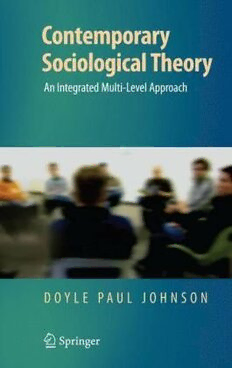
Contemporary Sociological Theory: An Integrated Multi-Level Approach PDF
629 Pages·2008·2.792 MB·English
Most books are stored in the elastic cloud where traffic is expensive. For this reason, we have a limit on daily download.
Preview Contemporary Sociological Theory: An Integrated Multi-Level Approach
Description:
"My graduate students thought it was very-well written, clear and organized. Several left class saying they have a much better understanding of theory as a result of the text. So, continued kudos and thanks for the great book for my MA level theory course." Mike McMullen, University of Houston-Clear LakeContemporary Sociological Theory: An Integrated, Multi-level Approachby D. Paul Johnson, Texas Tech University, Lubbock, TXThis book covers the major theoretical orientations that have been influential in American sociology since the mid-twentieth century. These include symbolic interaction, phenomenological sociology and ethnomethodology, social exchange and rational choice theories, sociology of emotions, functionalism and neofunctionalism, conflict and critical theory, selected feminist theories, structuration theory, systems theory, sociobiology, selected sociology of culture perspectives, and major themes from postmodern orientations. The distinctions between micro, meso, and macro levels serve as the organizing framework, with the micro/macro distinction related to the contrast between agency and structure. The various theories and theorists are compared, contrasted, and integrated as appropriate in portraying the complex and multidimensional features of the social world. Everyday life examples enable students to apply these abstract ideas to personal experiences and current social issues. Distinctive features include:Summaries of major ideas of the classical stage theorists which serve as a foundation for contemporary theories, including previously neglected contributions of women theorists;A chapter on formal theory construction, with discussion of its relevance to both quantitative and qualitative data analysis and to the status of sociology as a multiple-paradigm discipline;Coverage of communities, complex organizations, markets, and socioeconomic classes as distinctive meso-level social formations;Integration of rational choice theory and sociology of emotions, with application to communities and complex organizations;Focus on contrasting perspectives within each major theoretical orientation, plus conceptual and analytical linkages among these different orientations;Cultural systems and sociobiological characteristics covered in separate chapters distinct from the micro/meso/macro levels of the social world;Explicit attention given to individual identities, personal relationships, social networks, groups, residential and other kinds of communities, internal and external organizational relations, impersonal market transactions, socioeconomic class distinctions, institutional structures, and international relations.
See more
The list of books you might like
Most books are stored in the elastic cloud where traffic is expensive. For this reason, we have a limit on daily download.
